China Warns U.S. About North Korea’s Nuclear Arsenal
Chinese analysts are telling their American counterparts that North Korea's nuclear arsenal is far more sophisticated than previously believed.
The Wall Street Journal is reporting that the Chinese are issuing new, dire, warnings about North Korea’s nuclear program and its ability to project its nuclear arsenal beyond just South Korea and Japan:
China’s top nuclear experts have increased their estimates of North Korea’s nuclear weapons production well beyond most previous U.S. figures, suggesting Pyongyang can make enough warheads to threaten regional security for the U.S. and its allies.
The latest Chinese estimates, relayed in a closed-door meeting with U.S. nuclear specialists, showed that North Korea may already have 20 warheads, as well as the capability of producing enough weapons-grade uranium to double its arsenal by next year, according to people briefed on the matter.
A well-stocked nuclear armory in North Korea ramps up security fears in Japan and South Korea, neighboring U.S. allies that could seek their own nuclear weapons in defense. Washington has mutual defense treaties with Seoul and Tokyo, which mean an attack on South Korea or Japan is regarded as an attack on the U.S.
“I’m concerned that by 20, they actually have a nuclear arsenal,” said Siegfried Hecker, a Stanford University professor and former head of the Los Alamos National Laboratory, who attended the closed-door meeting in February. “The more they believe they have a fully functional nuclear arsenal and deterrent, the more difficult it’s going to be to walk them back from that.”
Chinese experts now believe North Korea has a greater domestic capacity to enrich uranium than previously thought, Mr. Hecker said.
The Chinese estimates reflect growing concern in Beijing over North Korea’s weapons program and what they see as U.S. inaction while President Barack Obama focuses on a nuclear deal with Iran.
A well-armed North Korea may prompt the U.S. to adopt countermeasures, especially in missile defense. Adm. William Gortney, head of U.S. Northern Command, said this month that defense officials believe North Korea can now mount a nuclear warhead on an intercontinental ballistic missile called the KN-08. U.S. officials don’t believe the missile has been tested, but experts estimate it has a range of about 5,600 miles—within reach of the western edge of the continental U.S., including California.
An increase in North Korea’s nuclear arsenal feeds international concern about proliferation from a country that, U.S. officials said, previously exported nuclear technology to Syria and missile components to Iran, Yemen and Egypt.
(…)
The latest Chinese estimates of North Korea’s nuclear capability were shared during a February meeting at the China Institute of International Studies, the Chinese foreign ministry’s think tank. The Chinese brought technical, political and diplomatic experts on North Korea’s nuclear program, as well as military representatives, said people familiar with the meeting.
Mr. Hecker, the U.S. team’s lead technical expert, has long been part of international efforts to understand North Korea’s nuclear program. In 2010, he revealed North Korea had a large uranium enrichment program after he saw the facilities during a visit there.
The estimate that North Korea may have had 20 warheads at the end of last year—and could build 20 more by 2016—was given during a presentation by one of China’s top uranium enrichment experts, according to people familiar with the meeting. They said it was the first time they had heard such a high Chinese estimate.
Building the nuclear weapons is, of course, only half of the issue the world faces in connection with North Korea. The arguably more important question is how far they are able project that power by delivering the weapon to a target, typically via a ballistic missile of some kind. In that regard, the North Koreans have had some success in developing missiles with longer and longer rangers, but have also had several notable failures in the form of test launches that barely got off the ground or which clearly did not reach their intended orbit. At present, though, it is believed that Pyongyang’s most reliable ballistic missile has a range of 5,600 miles, which theoretically puts North Korea’s arsenal within striking distance of not only its immediate neighbors but as far south as Australia, as far north as Russia, as far east as the majority of Europe, and as far west as Alaska, large swaths of Canada, and much of the American west. With an arsenal of 20-40 nuclear warheads, that means that a rather unstable regime in western Asia would suddenly have a gun pointed at much of the rest of the world.
The fact that the Chinese are acknowledging this now, and sharing it with the United States, could be indicative of the fact that Beijing is becoming ever more concerned by its neighbor and only now coming to realize just how much of a problem they could have on their hands in the future. Ever since Kim Jong Un came to power, it has seemed as though relations between Pyongyang and Beijing have soured to some degree. The Chinese were particularly outspoken about Kim’s actions on the peninsula two years ago when he cut off contact with the south, ended certain economic partnerships, repudiated the cease-fire that ended the Korean War, threatened U.S. bases in the Pacific, and otherwise took a number of steps that clearly increased tensions in the area. Many analysts suggested that their influence inside Pyongyang was reduced significantly when Kim had his uncle Jang Song Thaek executed in what seems in retrospect to have been an effort to consolidated his powers. More recently, tensions increased again when North Korea was accused of being behind a cyber attack on Sony’s computer systems at the end of last year over the anticipated release of a movie that satirized Kim Jong Un. What this report seems to suggest is that China is finally waking up to the threat that North Korea poses to the region and, potentially, the world.
While these reports are alarming, I’m not certain that there’s much that either we or the Chinese can do about it. Once the North Koreans developed nuclear weapons at all, it became unlikely that getting them to give that knowledge and technology up would be at all successful. Now that it seems apparent that the scope of their nuclear arsenal is far larger than previously thought, the odds of rolling back the clock on a nuclear North Korea are pretty much non-existent as long as their is a North Korea. Initially at least, reports such as these are likely to lead South Korea and Japan to work with the United States on more sophisticated missile defense systems, but one has to wonder if that will be enough to ease regional fears about what Pyongyang might do with its arsenal, especially if the time came that the leadership felt like their backs were against the wall. As always, the Chinese are probably better equipped to bring about change in North Korea than we are absent a war that would be disastrous for all concerned even if the ultimate outcome seems rather apparent. However, the fact that the Chinese are just now coming to realize the nature of what they’re dealing with, combined with the fact that China as territorial and other concerns completely unrelated to Korea that likely being given a higher priority, does not inspire much confidence in Beijing’s ability to deal with this either. In the end, North Korea is a pathetic state that is doomed to collapse at some point. The fact that its megalomaniac of a leader has access to nuclear weapons, though, and likely nowhere else to go if the regime does collapse, is most certainly something to worry about.
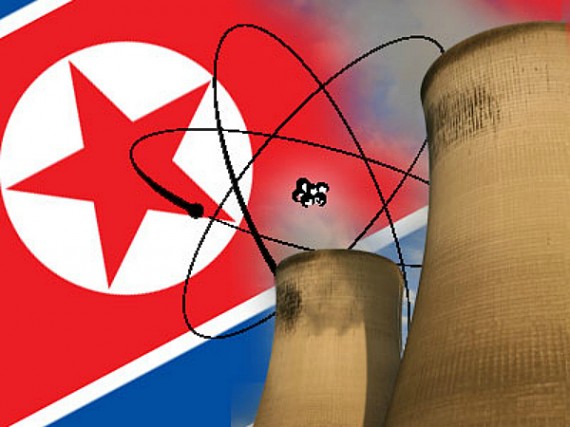

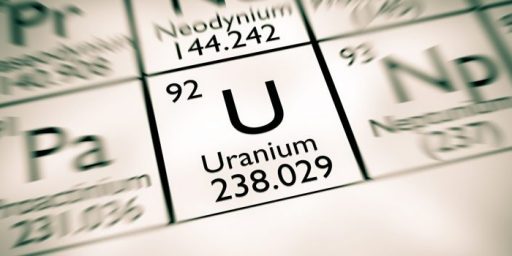
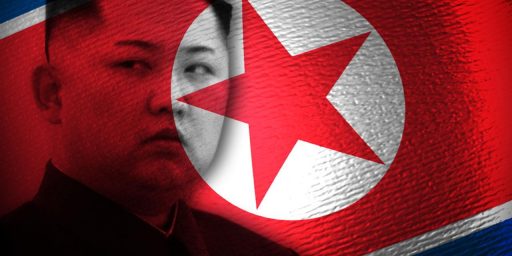
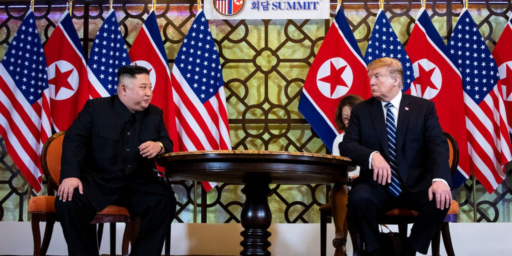
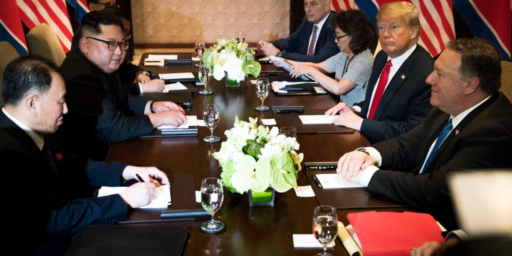
Well, if the Chinese are concerned that their client state has nuclear weapons, maybe they should do something about that.
Regime change from the US would require a nasty war, so a military coup would be the next logical step. There are plenty of people in North Korea that could put a bullet in the back of Kim Jung Un’s head, and they may be willing to try if they had the backing of the state’s sponsor.
We would, of course, have to condemn any Chinese involvement in the harshest diplomatic language, but I can’t imagine any American administration being unhappy with North Korea going towards less worse.
@Gustopher: Agreed. Or my alternate message to China: “You broke it, you bought it.” (I’m sure they’re listening!)
@Gustopher:
I agree. What the hell are the Chinese talking about with this “inaction” crap? They want to play regional superpower? Fine: deal with North Korea. We’re way over here on the other side of the Pacific, they’re right there next door.
Reminds me of the Europeans’ impotence in dealing with Serbia. They could have taken taxis to the front but we’ve got to fly bombers in from North Dakota, for God’s sake. And still somehow it was our problem.
That said, if the Chinese are worried I’m going to guess it’s because they’ve decided that Kim 3.0 is even buggier than the earlier Kims. The Chinese need to pull the trigger on this.
This is like one of the Mexican Cartels expressing concern that the US isn’t doing enough to stop the societal effects of drug crime in the inner cities.
@michael reynolds:
You got to it before I did, Michael. Damn right. The Chinese better pull up their big boy pants if they want to play big boy games on the international stage.
The more I think about this the more this looks like a deliberate signal from Beijing to Pyongyang: We are now cozying up to the Americans when it comes to dealing with you people. People in North Korea will see it that way, and possibly recognize it as a signal that it’s time to but two in Kim’s head.
I’ll bet a dollar that within six months Kim is deposed and replaced by a “reformist” general.
Heck, China could do in North Korea simply by opening the border and accepting everyone who makes it over the line.
@michael reynolds:
The Kim family has a certain unfortunate knack for staying in power. I’d be rich if I could have bet against any prognosticator (expert or otherwise) forecasting the demise of that dynasty’s rule over the DPRK.
@grumpy realist:
Which is exactly what China doesn’t want to encourage.
I’m honestly not sure what the Chinese are trying to accomplish with this. They’re saying that they believe that North Korea’s nuclear arsenal will soon rival their own (that’s what the numbers say).
You would think they might want to do something about that and, as NK’s largest patron by far, you’d also think they had some leverage.
The Chinese government doesn’t just do things. They do things for reasons. They’re much more disciplined in that way than we are for pretty obvious reasons.
Are they signalling to us that they wouldn’t be all that upset if we took some (unspecified) action? Are they signalling to the North Koreans that there are limits to their patience? Stay tuned.
@Dave Schuler:
Yeah, this was a statement from China. If I were Kim I’d read it as a warning.
The Chinese don’t want ten million NK refugees, and for good reason, as you know. But how much do they want radioactive clouds blowing over Chinese fields and cities? How much would they enjoy an American retaliation against the looney bin to their south if Kim does something insane like throw a nuke at Japan? The math may be changing for them.
I’d love to know what kind of forces the Chinese have up there in their north-east. Pyongyang looks to be less than a hundred miles from the Yalu.